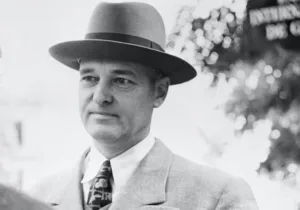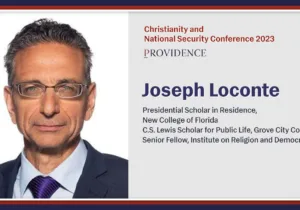President George H. W. Bush was the last of nine presidents directly involved in WWII. He also may be the last president with a specifically Mainline Protestant/WASP ethos that deeply shaped his confidence about America’s role in the world.
Bush dutifully joined the navy after Pearl Harbor at age 18, and the plane he piloted was shot down by the Japanese in the Pacific. Grainy film footage records his dramatic rescue. He had been raised in and was a lifelong communicant of the Episcopal Church. His devout mother drilled into him Bible lessons with admonitions about service and self-denial.
A distinguished family pedigree and Episcopal noblesse oblige instilled in Bush a comfort with power, governance and leadership. His father, a WWI veteran, investment banker and U.S. Senator whose generation led America into post-WWII global dominance, was his model.
Mainline Protestantism, especially the Episcopal Church, specialized in nurturing American democratic ideals and training its leaders. More presidents, starting with George Washington, have been Episcopalian than any other faith. Although never numerically very large, the Episcopal Church, descendant of the Church of England, long functioned as America’s semi-established church.
As president, Bush naturally attended St. John’s Episcopal Church on Lafayette Square, known as Church of the Presidents. When vacationing in Maine he attended a small Episcopal chapel. In Houston, he worshipped at St. Martin’s Episcopal, a large and theologically conservative congregation where Barbara Bush’s funeral was held earlier this year.
Bush like his father was always a firm internationalist who assumed the imperative of American global leadership. Unlike other Protestant bodies in the 1920s and 1930s, the Episcopal Church, due to its historic British ties and its close connection with the military, did not succumb to isolationism and pacifism. After WWII, Episcopalians like Secretary of State Dean Acheson, son of an Episcopal Bishop, led in creating American dominated global alliances and institutions intended to avoid another world war.
After success in the oil business, Bush entered his true calling as WASP governing elite, first as congressman, then as U.S. ambassador to the United Nations, envoy to China, Republican National Committee Chair, and CIA Director. He was a dutiful Vice President and understandably assumed he would become a Cold War President, for which his whole life and outlook had equipped him.
Instead, Bush would preside over the Berlin Wall’s collapse, the Soviet Union’s dissolution, Germany’s reunification, the Panama invasion, the Persian Gulf War, and the Somalia humanitarian intervention. These events left America as benign global hegemon, for which Bush articulated a New World Order.
His life experience and spirituality made Bush an ardent if not always articulate American patriot who saw global leadership and extolling of democratic values as his nation’s providential calling. Although he remained faithful to it, the Episcopal Church of his later political years was no longer stately counsel of American martial and political power.
The Episcopal Church’s Presiding Bishop outspokenly opposed the U.S. led Persian Gulf War to overturn Iraq’s occupation of Kuwait. He visited his parishioner in the White House to argue against military action. Bush challenged him on what to do about Iraqi brutality. The Presiding Bishop offered no clear alternative. In a speech to the National Religious Broadcasters, Bush argued for “just war” based on the Bible and Thomas Aquinas. On the eve of war, Billy Graham and not an Episcopal clergy spent the night at the White House with the Bush family.
U.S. led forces were of course victorious in Kuwait, but Saddam Hussein’s survival in Iraq left the victory feeling incomplete. Increasingly seen as from a bygone era, and unable to enunciate a persuasive case for assertive American leadership in the post Cold War world, Bush lost to Bill Clinton, a liberal Southern Baptist whose stated international goals were more modest.
Clinton’s successor, President George W. Bush, although United Methodist, professed to be born again and closely identified with and was strongly supported by Evangelicals. His father was likely the final presidential representative of once confident Mainline Protestantism and its previously robust stewardship of American global leadership.
There maybe another president from the now highly diminished Episcopal Church. But he or she will have little to no memory of a great spiritual tradition that soberly chaplained American power across decades.
Of course there will be future public servants who take seriously American global responsibilities and who are persons of faith. But with the implosion of Mainline Protestantism, which understood political power’s grave duties, what if any religious institutions can capably replace the Mainline as prudent minister to national leaders?
May God bless the memory of George H. W. Bush, a servant of Christ through the Episcopal Church. And may God summon others who share Bush’s sense of public responsibility and vocation for global leadership.






